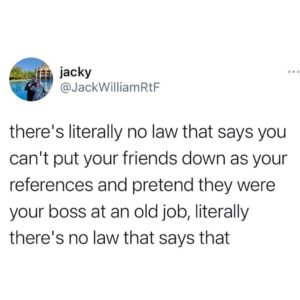
I was scrolling through Instagram the other day – yes, lawyers procrastinate too – and I came across this post:

I couldn’t tell whether it was trying to offer legal advice, so I googled “fake references.” I was alarmed to come across many purported “success stories” of employment applicants using fake references and even more alarmed to find several companies that apparently sell fake references. (I’m not going to link to any of those companies here.)
Take it from a lawyer whose job it is to stand up for employees: Using a fake reference is a really bad idea, for at least three reasons.
First, the vast majority of employers check references, and if you’re caught using a fake reference, your application will be immediately rejected. It’s not a gamble worth taking, especially if your application stands a chance of success based on your actual (true) skills and experiences.
Second, lying on a job application is potentially criminal. That’s right: not just “against the law,” but an actual crime. The definition of criminal fraud, in a nutshell, is lying in order to obtain something of value. Well, a job is something of value, and passing someone off as a professional reference when they’re not is a lie. No, most employers who catch you using a fake reference won’t bother filing a criminal complaint, and even if they did, most police departments probably wouldn’t bother investigating. But they could, and isn’t that enough to steer clear?
Third, your lie can follow you through your employment. And I don’t just mean that you’ll feel guilty (though you should). Of course, if your employer ever discovers your lie, you’re very likely to be fired – and for good reason. Beyond that, though, if you ever find yourself in a legal dispute with your employer – for wrongful termination, for example – your prior lie could torpedo your case. That is because of the doctrine of after-acquired evidence. Basically, if you sue your employer and they discover during the course of the lawsuit that you previously engaged in misconduct that clearly would have resulted in your termination – which they would be trying very hard to do – then the damages related to your termination immediately stop accruing. Plus, how sympathetic do you think the judge and jury are going to be when they hear that you only got your job through deceit?
I understand the desire to get your foot in the door of a new job, especially if you separated from your last employer under less-than-ideal circumstances. But lying on a job application isn’t the way to go.